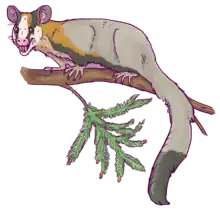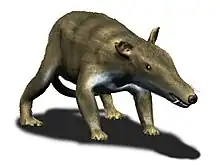| Reigitherium Temporal range: Late Cretaceous, | |
|---|---|
| Scientific classification | |
| Domain: | Eukaryota |
| Kingdom: | Animalia |
| Phylum: | Chordata |
| Class: | Mammalia |
| Clade: | †Meridiolestida |
| Clade: | †Mesungulatoidea |
| Family: | †Reigitheriidae Bonaparte, 1990 |
| Genus: | †Reigitherium Bonaparte, 1990[1] |
| Species: | †R. bunodontum |
| Binomial name | |
| †Reigitherium bunodontum Bonaparte, 1990 | |
Reigitherium was a mammal that lived during the Late Cretaceous, in the (Late Campanian-Maastrichtian). Its fossils have been found in the Los Alamitos and the La Colonia Formations of Argentina.
Description
The original specimen of Reigitherium was a fragmentary single molar tooth, with a lot of the surface detail damaged.[1] It was mistakenly identified as an upper left molar, but new material - including a whole tooth row of this species - clarifies that it was a lower right tooth.[2]
Reigitherium was a small mammal with simple premolars that increased in size along the tooth row to an enlarged fourth premolar. The molar teeth them decreased in size along the tooth row.
Taxonomy
Reigitherium has proven difficult to classify until recently, because the original fossil material was sparse, damaged, and difficult to identify. It was initially thought to be a dryolestid mammal when described in 1990.[1] Ten years later, Pascual et al. argued that it was a docodont based on the wear patterns they interpreted on the teeth.[3]
In 2011, Rougier et al. argued again for it being a dryolestoid, within Meridiolestida, an order of Gondwanan dryolestoids.[4] More complete fossils have now supported this analysis[2]
A recent phylogenetic study finds it to be the sister taxon to Peligrotherium.[2] Although the latter is much larger than Reigitherium, they share many tooth and skull characteristics that indicate they are closely related.
References
- 1 2 3 Bonaparte, J. F. New Late Cretaceous mammals from the Los-Alamitos formation, Northern Patagonia. National Geographic Research 6.1 63-83.
- 1 2 3 Harper T, Parras A, Rougier GW. 2018. Reigitherium (Meridiolestida, Mesungulatoidea) an enigmatic Late Cretaceous mammal from Patagonia, Argentina: morphology, affinities, and dental evolution. Journal of Mammalian Evolution.
- ↑ Pascual R., Goin F.J., Gonzalez P., Ardolino A. & Puerta P.F. (2000) A highly derived docodont from the Patagonian Late Cretaceous Geodiversitas 22 (3) Documento pdf Archived 2012-04-14 at the Wayback Machine.
- ↑ Guillermo W. Rougier; Sebastián Apesteguía; Leandro C. Gaetano (2011). "Highly specialized mammalian skulls from the Late Cretaceous of South America". Nature. 479 (7371): 98–102. Bibcode:2011Natur.479...98R. doi:10.1038/nature10591. PMID 22051679. S2CID 4380850. Supplementary information




